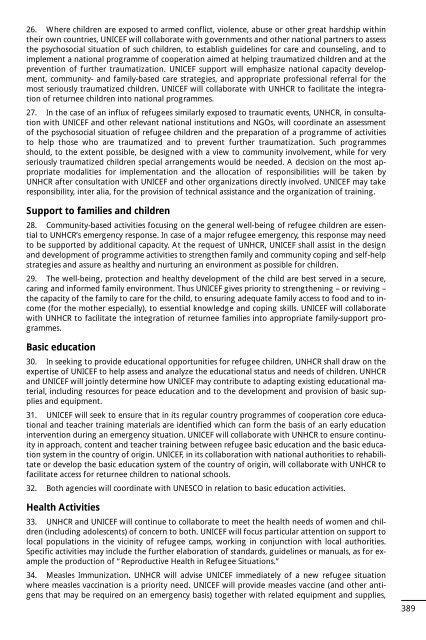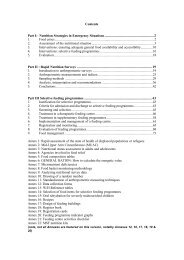UNHCR Handbook for Emergencies - UNHCR eCentre
UNHCR Handbook for Emergencies - UNHCR eCentre
UNHCR Handbook for Emergencies - UNHCR eCentre
Create successful ePaper yourself
Turn your PDF publications into a flip-book with our unique Google optimized e-Paper software.
26. Where children are exposed to armed conflict, violence, abuse or other great hardship within<br />
their own countries, UNICEF will collaborate with governments and other national partners to assess<br />
the psychosocial situation of such children, to establish guidelines <strong>for</strong> care and counseling, and to<br />
implement a national programme of cooperation aimed at helping traumatized children and at the<br />
prevention of further traumatization. UNICEF support will emphasize national capacity development,<br />
community- and family-based care strategies, and appropriate professional referral <strong>for</strong> the<br />
most seriously traumatized children. UNICEF will collaborate with <strong>UNHCR</strong> to facilitate the integration<br />
of returnee children into national programmes.<br />
27. In the case of an influx of refugees similarly exposed to traumatic events, <strong>UNHCR</strong>, in consultation<br />
with UNICEF and other relevant national institutions and NGOs, will coordinate an assessment<br />
of the psychosocial situation of refugee children and the preparation of a programme of activities<br />
to help those who are traumatized and to prevent further traumatization. Such programmes<br />
should, to the extent possible, be designed with a view to community involvement, while <strong>for</strong> very<br />
seriously traumatized children special arrangements would be needed. A decision on the most appropriate<br />
modalities <strong>for</strong> implementation and the allocation of responsibilities will be taken by<br />
<strong>UNHCR</strong> after consultation with UNICEF and other organizations directly involved. UNICEF may take<br />
responsibility, inter alia, <strong>for</strong> the provision of technical assistance and the organization of training.<br />
Support to families and children<br />
28. Community-based activities focusing on the general well-being of refugee children are essential<br />
to <strong>UNHCR</strong>’s emergency response. In case of a major refugee emergency, this response may need<br />
to be supported by additional capacity. At the request of <strong>UNHCR</strong>, UNICEF shall assist in the design<br />
and development of programme activities to strengthen family and community coping and self-help<br />
strategies and assure as healthy and nurturing an environment as possible <strong>for</strong> children.<br />
29. The well-being, protection and healthy development of the child are best served in a secure,<br />
caring and in<strong>for</strong>med family environment. Thus UNICEF gives priority to strengthening – or reviving –<br />
the capacity of the family to care <strong>for</strong> the child, to ensuring adequate family access to food and to income<br />
(<strong>for</strong> the mother especially), to essential knowledge and coping skills. UNICEF will collaborate<br />
with <strong>UNHCR</strong> to facilitate the integration of returnee families into appropriate family-support programmes.<br />
Basic education<br />
30. In seeking to provide educational opportunities <strong>for</strong> refugee children, <strong>UNHCR</strong> shall draw on the<br />
expertise of UNICEF to help assess and analyze the educational status and needs of children. <strong>UNHCR</strong><br />
and UNICEF will jointly determine how UNICEF may contribute to adapting existing educational material,<br />
including resources <strong>for</strong> peace education and to the development and provision of basic supplies<br />
and equipment.<br />
31. UNICEF will seek to ensure that in its regular country programmes of cooperation core educational<br />
and teacher training materials are identified which can <strong>for</strong>m the basis of an early education<br />
intervention during an emergency situation. UNICEF will collaborate with <strong>UNHCR</strong> to ensure continuity<br />
in approach, content and teacher training between refugee basic education and the basic education<br />
system in the country of origin. UNICEF, in its collaboration with national authorities to rehabilitate<br />
or develop the basic education system of the country of origin, will collaborate with <strong>UNHCR</strong> to<br />
facilitate access <strong>for</strong> returnee children to national schools.<br />
32. Both agencies will coordinate with UNESCO in relation to basic education activities.<br />
Health Activities<br />
33. <strong>UNHCR</strong> and UNICEF will continue to collaborate to meet the health needs of women and children<br />
(including adolescents) of concern to both. UNICEF will focus particular attention on support to<br />
local populations in the vicinity of refugee camps, working in conjunction with local authorities.<br />
Specific activities may include the further elaboration of standards, guidelines or manuals, as <strong>for</strong> example<br />
the production of “Reproductive Health in Refugee Situations.”<br />
34. Measles Immunization. <strong>UNHCR</strong> will advise UNICEF immediately of a new refugee situation<br />
where measles vaccination is a priority need. UNICEF will provide measles vaccine (and other antigens<br />
that may be required on an emergency basis) together with related equipment and supplies,<br />
389



